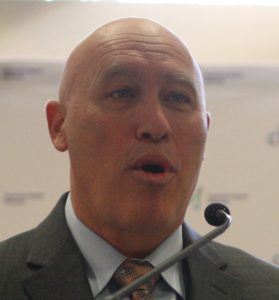Incoming Cooperative Baptist Fellowship Executive Coordinator Paul Baxley outlined three immediate priorities at a Friday press conference held in Atlanta in conjunction with a regularly scheduled meeting of the CBF Governing Board.

Paul Baxley outlines his initial priorities as new CBF executive coordinator at Friday’s press conference. (BNG photo/Bob Allen)
Baxley, senior minister at First Baptist Church in Athens, Georgia, and a past member of the Governing Board, said – as he would do in any new pastoral role – he plans to take time to get to know CBF Baptists by visiting congregations and state and regional gatherings and laying groundwork for relationships with partner ministries and networks.
Second, Baxley said he wants to work with global missions, leadership, field personnel and the CBF Missions Council to invite congregations into deeper participation in global missions.
“I want to see us dramatically increase our support of the Offering for Global Missions, but I also want to see each of our congregations consider a close partnership in ministry with one of our field personnel,” Baxley said. “I can promise you such a relationship will not only connect you to a deeper participation in Christ’s mission far away, it will also make you more faithful in mission in your community and draw you closer to Christ.”
“Thirdly, I will be laying the groundwork to challenge our Fellowship to renew our commitment to partnering with congregations, theological schools, ministers, and others to help new generations of women and men hear a calling to ministry and mission, and to make sure we offer those who are called the best possible preparation and the most significant encouragement to lives of thriving in faithfulness,” Baxley said in prepared remarks.
“Much has changed in recent years,” he said. “Our Fellowship has a growing community of young Baptists, but our theological schools are changing and the patterns of congregational life are changing. In addition to cooperating for Global Missions, we Baptists have been at our best when we have also been drawn together in a deep commitment to the calling, forming and thriving of new generations of ministers. For the sake of our present, and even more for the sake of our future, we must discern a new covenant for calling and forming.”
After the formal news conference, Baxley met with reporters for follow-up questions. Following are excerpts from that conversation.
On the hiring process and why he wanted the job:
“I’m certainly not somebody who got tired of being a pastor. (The hiring process) has been a gradual journey for me. It’s really forced me to come to terms with the truth that individual congregations, no matter how well we’re doing in a moment, cannot thrive unless they are in relationship with others. For the health of all our congregations we need CBF to draw us into relationships and mission and ministry and do things with us that none of us, no matter how healthy we are, can do on our own.
“Gradually as I reflected on that and prayed on that more, it brought me to a place where while our family still has great grief about the season that’s ending, we do feel a call to do this, and I am really hopeful about CBF’s future.”
On his leadership philosophy:
“My leadership philosophy is collaborative. I think on my best days I’ve been able to help groups of people get in rooms together and identify the right questions that we need to ask and to pray intensely about what we need to do. I’ve never found a situation where an idea didn’t get better because of collaboration. I’ve learned that sometimes questions we think people will never be willing to ask, if you give permission people not only have the courage to ask those kinds of questions but to implement the answers in ways that would exceed our imagination.”
On the differences among moderate Baptists that vary by geography:
“The way I see it, CBF is never going to be a one-size-fits-all movement. All of our states and regions have a unique relationship with us. None of our theological schools are absolutely identical.
“I think we live in a Baptist culture and environment where our ability to do ministry and maintain partnerships that are reflective of the parts of the Fellowship they most serve is a ministry asset to us, and we need to see that diversity as well as other kinds of diversity as a real source of advantage for us.”

Jeff Roberts, senior pastor of Trinity Baptist Church in Raleigh, North Carolina, who chaired the search committee that unanimously recommended Paul Baxley as the next CBF executive coordinator, describes the process to reporters and members of the CBF Governing Board at Friday’s press conference. (BNG photo/Bob Allen)
On the closing of Baptist Theological Seminary at Richmond, where he worked on staff four years and received his doctor-of-ministry degree in 2003:
“I would not be here without the Baptist Theological Seminary at Richmond. In the time I was at that school, they were amazingly innovative.”
While at BTSR, Baxley directed a team that developed a proposal in 2001-2002 that secured a $2 million Lilly grant.
“Under Tom Graves’s leadership, we gave more than half of it away to congregations and CBF partners and the wider CBF ecology, because at the position of strength that was at that point, that seminary community was not content just to keep the money for itself.
“Baptist Theological Seminary wanted to invest in the strength of a larger community. There’s a reason that at BTSR graduation graduates are given a towel with their name on it. The ministry is bigger than any one person. The ministry is bigger than any one institution.
“Left to our own devices long enough in isolation, sooner or later we will die. So investing in a wider community, seeing a bigger picture, trying to serve and empower that, those were qualities of Baptist Seminary at Richmond in the time I was in that community, and those are qualities that are deeply formative for how I view the opportunity, the challenge and the hope before us.”
On relating to Baptist news media:
“I respect and appreciate the important role that our media partners play in helping our Fellowship reflect on the important news going on in the world around us. We want to make sure that we have a really strong relationship [with the press], because we think that’s what strengthens our Fellowship – people being able to ask questions and be in conversation. That’s really important for our health and vitality going forward.”
Previous story:
CBF elects Georgia pastor Paul Baxley as executive coordinator
Related commentary:
Why CBF exists: to serve congregations and help them thrive
